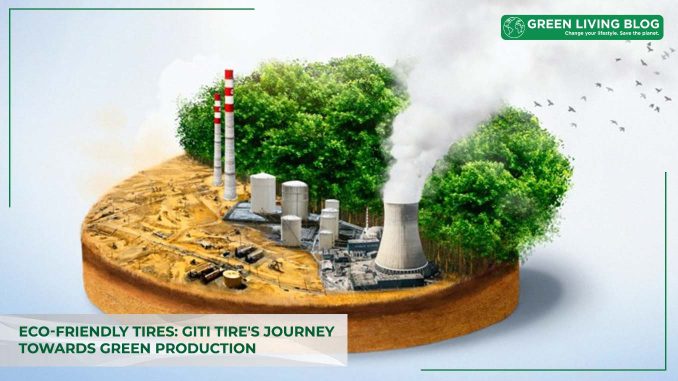
The rubber sector has a critical problem in the modern world, where environmental sustainability has taken on global importance: innovating and changing its production processes to adopt more environmentally friendly and sustainable methods.
Leading the front in this change is Giti Tire, a well-known brand in the tire manufacturing sector. Giti Tire has dedicated itself to leading sustainable practices in recognition of the substantial environmental impact associated with traditional rubber manufacturing, which includes waste generation and high energy use.
This commitment is an integral part of their company ethos, indicating a deeper awareness of their responsibilities towards the world, rather than merely a reaction to market trends or governmental demands.
The Importance of Eco-Friendly Tire Manufacturing

The rubber industry, integral to various sectors from automotive to healthcare, historically has had a significant environmental footprint. This footprint encompasses a range of ecological concerns, including high energy consumption, greenhouse gas emissions, and waste generation. In light of these challenges, the move towards eco-friendly manufacturing is not just an environmental imperative but also a strategic business decision.
Acknowledging the problems facing the industry as a whole, Giti Tire has moved proactively to lessen its negative effects on the environment. Their strategy transcends the traditional production mindset by emphasizing resource conservation, recycling promotion, emissions reduction, and sustainable activities. Giti Tire is taking the rubber business by storm by implementing green production techniques like water recycling, flue-gas desulfurization, and green energy use. In a time when people are becoming more conscious of and worried about the environmental effects of the things they use, these activities are essential.
Furthermore, the rubber industry’s environmentally benign production practices support international efforts to mitigate climate change. Companies like Giti Tire are advancing the greater global objective of sustainable development by lowering their carbon footprint. This transition to green manufacturing guarantees the industry’s long-term survival while simultaneously protecting the environment for coming generations.
Background on Sustainability at Giti Tire

Giti Tire, with a history stretching back over 70 years, has evolved from its roots in Indonesia to become a global leader in the tire industry. As a Singapore-based multinational company, Giti Tire has demonstrated resilience and consistency in a highly competitive and fast-changing market. With a 2022 revenue of 2.838 billion USD, the company showcases its significant presence in the global economy
With operations in China, Indonesia, and the United States, Giti Tire maintains a sizable global production and research and development footprint. Its continued success and expansion are attributed to this global network’s inventive sales, marketing, and distribution strategies as well as its active involvement in international racing.
With almost 30,000 employees globally, Giti Tire’s staff is evidence of its size and dedication to offering job opportunities in various locations. This large and varied crew is essential to preserving the standard of excellence and innovation for which Giti Tire is renowned.
Giti Tire’s concept is centred on three main areas: being a responsible business partner, supporting employee growth and creativity, and producing high-quality products and innovations. This strategy is distinguished by its dedication to providing dependable goods and services, encouraging employee leadership and personal development, and maintaining the greatest levels of sustainability and corporate governance. Giti Tire operates under these guiding principles, which make sure that they fulfil client expectations and go above and above while also being aware of their social and environmental responsibilities.
Giti Tire’s Green Production Strategy

Giti Tire’s strategy for green production is not just about reducing its own environmental footprint; it also involves extensive cooperation with renowned organizations to promote ecological sustainability globally. One such collaboration is with Conservation International, where Giti has been instrumental in protecting the rainforest in Sumatra, Indonesia, and the southwestern mountains of China, significantly contributing to carbon emission purification.
Conservation and Community Engagement
Beyond its methods of production, Giti Tire is actively involved in environmental projects in green industries. Giti’s dedication to preserving marine life is demonstrated by its long-standing collaboration with Conservation International, which includes initiatives like shark tagging and preservation. Real-time tracking of the largest fish in the world is part of this endeavour, which highlights Giti’s commitment to utilizing technology to protect the environment.
Supporting World Heritage Sites and Biodiversity

Giti Tire supports cultural heritage and biodiversity as part of its environmental efforts. One instance of this is their assistance in helping Hoh Xil in Qinghai, China, become a World Heritage Site. Giti’s engagement in conservation initiatives, such as safeguarding Tibetan antelopes, exemplifies their dedication to maintaining natural balance and maintaining cultural traditions.
In summary
The transition of Giti Tire to environmentally friendly manufacture is a potent illustration of how industrial processes may incorporate environmental responsibility. Their initiatives in community involvement, worldwide conservation, and environmentally sustainable manufacturing demonstrate a holistic approach to sustainability. Giti Tire’s activities are a shining example of how industrial success and environmental care can and should coexist as the rubber industry continues to change.
Green manufacturing, a crucial initiative across industries, represents a significant shift towards sustainable and environmentally responsible production methods. This approach prioritizes reducing environmental impact through innovative practices like energy efficiency, waste reduction, and the use of eco-friendly materials. By adopting green manufacturing, companies not only contribute to mitigating the effects of climate change and preserving natural resources but also respond to the growing consumer demand for sustainable products. This shift is essential for the long-term health of our planet and for meeting the global goals of sustainable development.
![]()
Author Profile
- Online Media & PR Strategist
- Blogger and Educator by Passion | Senior Online Media & PR Strategist at ClickDo Ltd. | Fascinated to Write Lifestyle Blogs in News & Education I have completed a journalism summer course at the London School of Journalism and manage various blogs.
Latest entries
 BusinessOctober 29, 2025Top 6 UK Government Green Funds & Grants for SMEs
BusinessOctober 29, 2025Top 6 UK Government Green Funds & Grants for SMEs List postOctober 16, 202510 Best Green Hosting Services in the UK
List postOctober 16, 202510 Best Green Hosting Services in the UK BusinessSeptember 9, 2025Top 5 Eco Certifications & Their Impact on Greener Businesses
BusinessSeptember 9, 2025Top 5 Eco Certifications & Their Impact on Greener Businesses LeisureSeptember 2, 2025Plant-Power: The UK’s Top 10 Vegan Festivals 2025
LeisureSeptember 2, 2025Plant-Power: The UK’s Top 10 Vegan Festivals 2025






Leave a Reply
You must be logged in to post a comment.